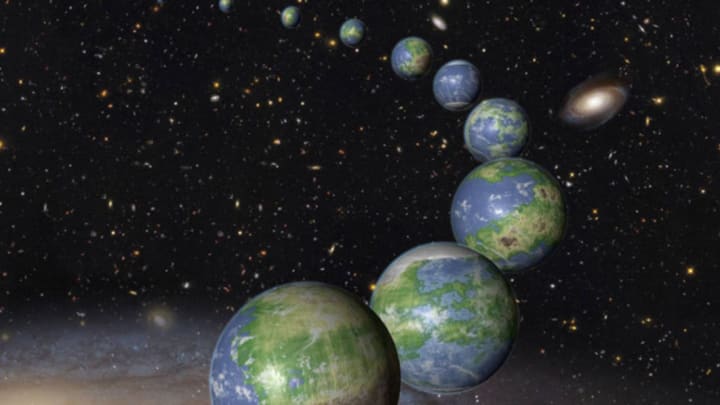A new theoretical study, "On The History and Future of Cosmic Planet Formation" [PDF], suggests Earth got a head-start when it came to the development of the universe. Based on data gathered by the Hubble telescope and the Kepler space observatory, astronomers from NASA’s Space Telescope Science Institute have concluded that 92 percent of the Earth-like planets that will inhabit the universe don’t exist yet.
An “Earth-like” world is classified as a planet that is similar in size to ours and is at an ideal distance from its star to allow water to pool on its surface and possibly host life. When our solar system was created 4.6 billion years ago, Earth was part of only eight percent of the potentially life-nurturing worlds that will ever come into existence. Six billion years from now, when the Sun burns out and takes the Earth with it, the bulk of the universe's life history may have yet to be written.
Astronomers arrived at this conclusion by compiling a “family album” of galaxy observations from the Hubble telescope detailing the universe’s star formation history. Ten billion years ago, stars were being produced at a rapid rate, though this used a relatively low amount of the universe’s hydrogen and helium. Today, stars are being created at a much slower pace, and the extra gas that’s left over will provide the materials for more stars to be created well into the future.
Scientists estimate there are 1 billion Earth-sized planets in our galaxy alone, many of which are presumed to be rocky. That number explodes when you include data from the additional 100 billion galaxies in the observable universe. Despite these figures, we’ve yet to discover life, intelligent or otherwise, outside our planet, prompting many scientists to ask, “Where is everybody?” This new study indicates that humanity made a much earlier appearance than the majority of life that could ever exist in the universe, but that’s no reason to count out foreign life existing in some form or another at the same time as us, whether it's on the other side of the universe or right next door.
